Month: October 2021
-
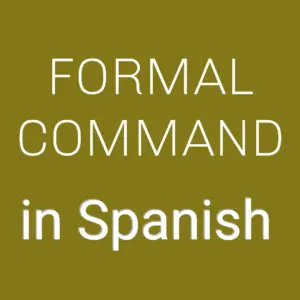
Formal Commands in Spanish
How do you give formal commands in Spanish? Formal commands in Spanish are used when ordering or telling someone to do something. This is often referred to as the “imperative” form of the verb. Haga Ud. el desayuno.- Make (You) breakfast. Escriba Ud. la carta. – Write (You) the letter. Salgan Uds. primero. – (You-all) Come out first…
-
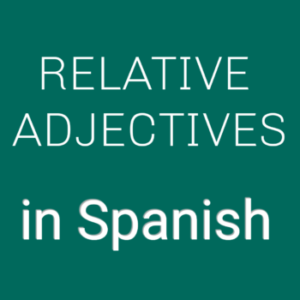
Relative Adjectives in Spanish
What are Relative Adjectives in Spanish? Note: We include the relative adjectives in Spanish “cuyo, cuya, cuyos, cuyas” in this discussion because it relates the owner to that which is owned, as does the English “whose”. e.g La gata, cuyo dueño es mi hermano, es muy peligrosa – The cat, whose owner is my brother, is very dangerous…
-
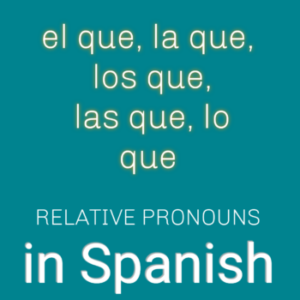
el que, la que, los que, las que, lo que in Spanish
What are Relative Pronouns in Spanish?: el que, la que, los que, las que, lo que Note: The relative pronouns: (el que, la que, los que, las que, lo que) in Spanish are used to refer to both people and things. Note that there are four forms to accommodate singular and plural, masculine and feminine.…
-
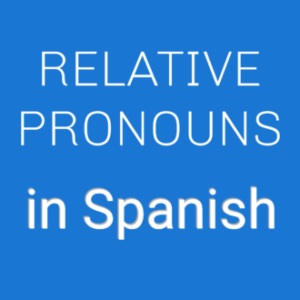
Relative Pronouns in Spanish
Learn how and when to use the relative pronouns in Spanish. Qué, Quién: Relative Pronouns in Spanish Que: relative pronouns One way to view relative pronouns is to recognize that they combine two sentences that share a common noun. In the following examples, the common nouns are “butter” or “mantequilla”; “homework” or “tarea” e.g. ¿Dónde…
-
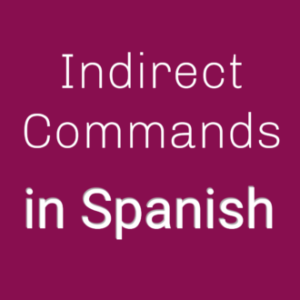
Indirect Commands in Spanish
What is an indirect command in Spanish? Learn how to use the indirect commands in Spanish. Note: When the command is given through a third party, indirect commands in Spanish are used. The form is “que + Present subjunctive” e.g. Que venga Rosa. – Let Rose come. Que vengan a las once – Have them come at…
-

Imperfect Subjunctive in Spanish
What is the Imperfect Subjunctive in Spanish? The Imperfect tense of the subjunctive mood is used to express the same subjectivity as the Present subjunctive, but in the past. Imperfect Subjunctive in Spanish 1 To indicate an action in the past in the same situations where the subjunctive would be required in the Present: e.g.…
-

When Are You Coming in Spanish
How to say when are you coming’ in Spanish? To say “When are you coming?” in Spanish, you can use the following phrase: “¿Cuándo vienes?” In this phrase, “cuándo” means “when” and “vienes” means “are you coming.” You can use this phrase to ask someone about their arrival time or schedule. Example: Here is some…
-

Where Are You Now in Spanish
How to say where are you now in Spanish? ¿Cómo se dice where are you now en español? Where are you now in Spanish translation: dónde estás ahora. you(informal)(singular) -Where are you now? – ¿Dónde estás tú ahora? you(formal)(singular) -Where are you now? – ¿Dónde está usted ahora? you(plural) -Where are you now? – ¿Dónde…
-

Where Are We Going in Spanish
How to say where are we going in Spanish? ¿Cómo se dice where are we going en español? Where are we going in Spanish translation: a dónde vamos. Where are we going?- ¿A dónde vamos?Where are you taking me?- ¿A dónde me llevas?Where are we headed?- ¿A dónde nos dirigimos? How do you say ‘where…
-

Where is The Milk in Spanish
How do you say ‘where is the milk in Spanish?’. ‘Where is the milk?’ is used to ask what specific place the milk is found in. Milk is basic food and balanced due to its high content of nutrients; it has an excellent nutritional density and is one of the most important sources of energy.…
-

Where Were You Born in Spanish?
How to say where were you born in Spanish? ¿Cómo se dice where were you born en español? Where were you born in Spanish translation: dónde naciste. you(informal)(singular) – Where were you born? – ¿Dónde naciste?. ¿En dónde naciste? you(formal)(singular) – Where were you born? – ¿Dónde usted nació?. ¿En dónde usted nació? Where was…
-

Day 7 – Spanish Trivia Questions
Day 7 – Spanish Trivia Questions. Practice your Spanish skills with these daily Spanish trivia questions. Improve your knowledge. Practice basic, grammatical and Spanish conjugations online. Loading… More Spanish Quizzes More Trivia Questions Students Leaderboard